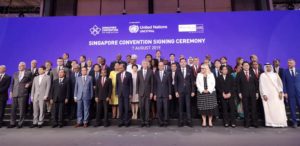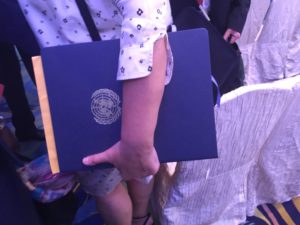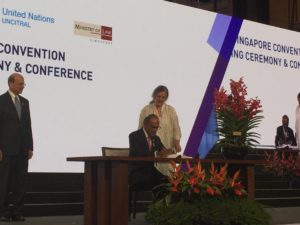It was an amazing week for Singapore! The highlight was the signing of the UN Convention on International Mediated Settlement Agreements Resulting from Mediation, now known as the Singapore Convention on Mediation, on 7 August 2019 (Wednesday) at the Shangri La Hotel in Singapore.
Here is a picture of all the dignatories who signed with Prime Minister Lee Hsien Loong of Singapore and UN Assistant Secretary-General for Legal Affairs Stephen Mathias.

And here is a snap of real thing — The Singapore Convention. Inside are all the signatures!

The Ceremony was opened by Singapore Prime Minister Lee Hsien Loong, who hailed the instrument as a powerful affirmation of multilateralism. Officiated by UN Assistant Secretary-General for Legal Affairs Stephen Mathias, who declared the Convention open for signing, the Singapore Convention on Mediation – the first UN treaty named after Singapore – establishes a mechanism for the expedited enforcement of international mediated settlement agreements. It will provide cross-border mediation practice with the regulatory robustness essential for it to become recognised as a major player in international dispute resolution.
A total of 46 states signed the Convention on 7 August, 2019.
They are listed here in order of signing.
1. Singapore
2. Afghanistan
3. Belarus
4. Benin
5. Brunei
6. Chile
7. China
8. Colombia
9. Congo
10. Democratic Republic of Congo
11. Eswatini
12. Fiji
13. Georgia
14. Grenada
15. Haiti
16. Honduras
17. India
18. Iran
19. Israel
20. Jamaica
21. Jordan
22. Kazakhstan
23. Laos
24. Malaysia
25. Maldives
26. Mauritius
27. Montenegro
28. Nigeria
29. North Macedonia
30. Palau
31. Paraguay
32. The Philippines
33. Qatar
34. South Korea
35. Samoa
36. Saudi Arabia
37. Serbia
38. Sierra Leone
39. Sri Lanka
40. Timor-Leste
41. Turkey
42. Uganda
43. Ukraine
44. The United States of America
45. Uruguay
46. Venezuela
This is an unprecedented number, and it is indicative of the global trend to embrace mediation processes in the toolbox of cross-border dispute resolution mechanisms.
And, finally mention must be made of the newly named orchid, Aranda Singapore Convention on Mediation. Here is a picture of Minister Shanmugam signing on behalf of Singapore. Notice the orchid on the table on his left. This new orchid has been officially named the Aranda Singapore Convention on Mediation and it has been planted in Singapore’s botanical gardens. Yet another reason to visit Singapore.

The next step for the states that have signed on to the Convention is ratification. And of course, at the Kluwer Mediation Blog, we will keep you posted on these developments.
________________________
To make sure you do not miss out on regular updates from the Kluwer Mediation Blog, please subscribe here.



What an incredible achievement!!
Congratulations to all, and especially to Singapore for putting on what, by all accounts, was the world’s biggest mediation party!
It was a week long party, Mike! And now, once we are all recovered, let’s see how long the ratification process takes.
Congratulations, another important milestone in this fascinating journey of transforming dispute resolution. Let’s hope that the ratification process will not take too long and more countries will join soon. Thank you Nadja, and all the others involved, for doing this groundbreaking work.
Great to hear from you Sabine. I think so much of the work will really begin now 🙂
Nadia, as you rightly imply, the Singapore Convention on Mediation carries tremendous significance for mediation. But it does even more than provide – at last – an international enforcement mechanism for mediated settlements. As more nations sign and in due course ratify the Convention, there are vital holistic consequences. Those of you in Singapore and around the world who had the vision and patience to dedicate so much effort to making this happen, and to getting it off to such a great start, have done for mediation what the New York Convention did for arbitration – you have increased its credibility, profile, understanding and respect. This factor should not be under-appreciated. Hopefully, the mediation field has new impetus to develop strategies to shrug off its unfortunate and inaccurate “alternative” image and become the “new normal”, the natural and, in most cases, the optimal way to resolve disputes and to make deals.
Dear Professor Alexander,
Congratulations on this great achievement!
Do you think the EU (as a whole or its individual member states) is likely to sign and ratify this Convention? I have read that they sadly did not attend the Ceremony…
Kind regards,